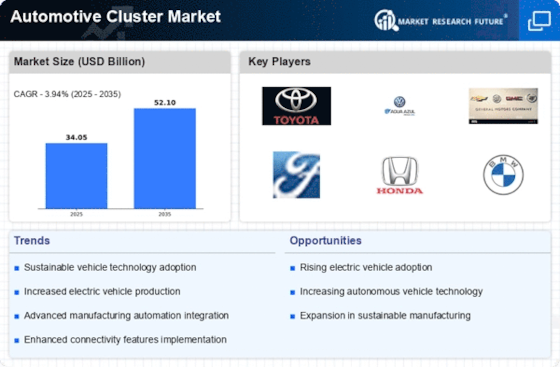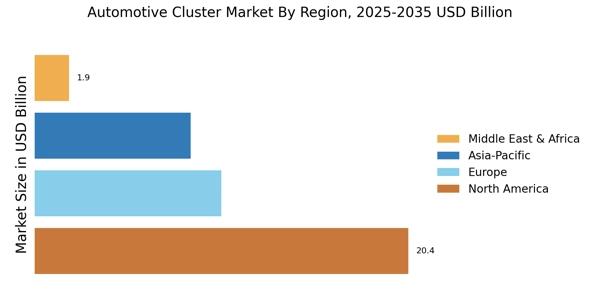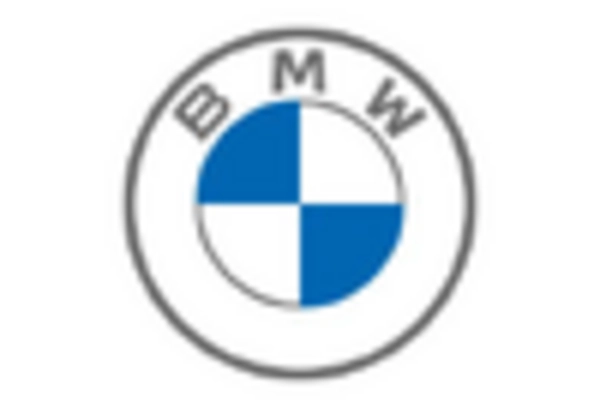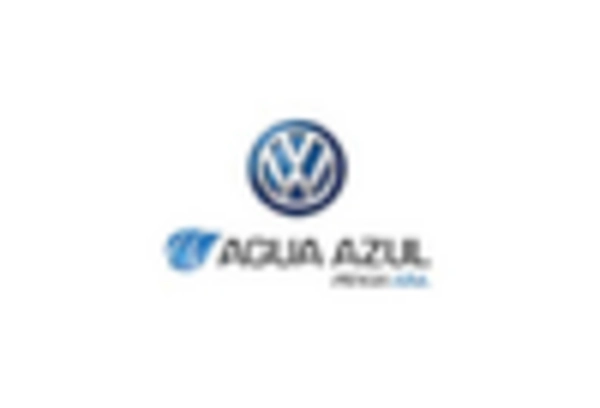Rising Demand for Electric Vehicles
The Automotive Cluster Market is experiencing a notable shift towards electric vehicles (EVs), driven by increasing consumer awareness regarding environmental sustainability. As governments implement stricter emissions regulations, the demand for EVs is projected to rise significantly. In 2025, it is estimated that EV sales could account for over 30% of total vehicle sales, reflecting a substantial increase from previous years. This transition not only influences manufacturers to innovate but also encourages the development of supporting infrastructure, such as charging stations. Consequently, the Automotive Cluster Market is likely to witness a surge in investments aimed at enhancing EV technology and infrastructure, thereby fostering growth and competitiveness.
Expansion of Autonomous Vehicle Technology
The expansion of autonomous vehicle technology is poised to transform the Automotive Cluster Market significantly. As research and development in this area progresses, the potential for fully autonomous vehicles is becoming increasingly feasible. By 2025, it is anticipated that several manufacturers will introduce Level 4 autonomous vehicles, which can operate without human intervention in specific conditions. This advancement could lead to a paradigm shift in transportation, impacting urban planning and mobility solutions. Moreover, the integration of autonomous technology is expected to enhance safety and reduce traffic congestion, thereby attracting investments in the Automotive Cluster Market aimed at furthering these innovations.
Increased Focus on Supply Chain Resilience
The Automotive Cluster Market is currently experiencing an increased focus on supply chain resilience, particularly in light of recent disruptions. Manufacturers are recognizing the importance of establishing robust supply chains that can withstand unforeseen challenges. In 2025, it is projected that companies will invest significantly in diversifying their supplier base and adopting advanced supply chain management technologies. This shift aims to mitigate risks associated with single-source dependencies and enhance overall operational efficiency. As a result, the Automotive Cluster Market is likely to see a transformation in how companies approach logistics and inventory management, fostering a more agile and responsive market environment.
Growing Consumer Preference for Connected Vehicles
The Automotive Cluster Market is witnessing a growing consumer preference for connected vehicles, which offer enhanced features such as real-time navigation, infotainment systems, and vehicle-to-vehicle communication. This trend is largely driven by the increasing reliance on technology in daily life, as consumers seek vehicles that provide seamless connectivity. In 2025, it is projected that nearly 50% of new vehicles sold will be equipped with advanced connectivity features. This shift not only enhances the driving experience but also opens new avenues for data monetization and service offerings. Consequently, the Automotive Cluster Market is likely to see a rise in partnerships between automakers and technology firms to develop innovative connected solutions.
Technological Advancements in Automotive Manufacturing
Technological advancements are reshaping the Automotive Cluster Market, particularly through the adoption of automation and artificial intelligence in manufacturing processes. These innovations enhance production efficiency and reduce operational costs, allowing manufacturers to respond swiftly to market demands. For instance, the integration of robotics in assembly lines has been shown to increase productivity by up to 20%. Furthermore, the use of data analytics enables companies to optimize supply chain management, thereby minimizing delays and improving customer satisfaction. As these technologies continue to evolve, the Automotive Cluster Market is expected to benefit from improved quality control and reduced time-to-market for new vehicle models.

















